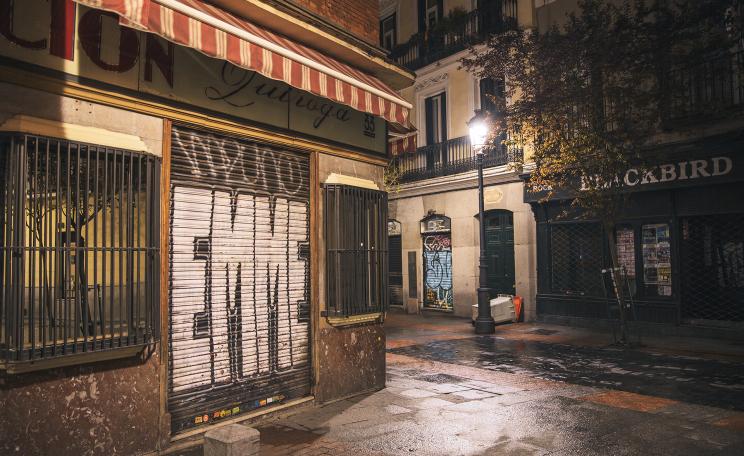The only plausible way to reduce the UK consumption emissions footprint to net-zero is, alongside strong domestic action, to support other countries in setting and achieving economy-wide Net Zero targets themselves.
One of the small frustrations of the new hybrid House of Lords (balanced of course by the fact that, unlike the Commons, it allows full participation by all, including those shielding, and remote voting) is the fact that no one can leap to their feet to interrupt a minister.
The formula is “before the noble Lord sits down” – even if they have very swiftly applied their rump to the red leather.
Before lockdown, I’d been waiting for the chance to say that to a government minister - who boasted endlessly about the UK “cutting” carbon emissions by 44 percent since 2008 - that exporting emissions is not the same as cutting them.
Emissions
Last week’s Progress Report from the independent Committee on Climate Change 2020 makes a point of highlighting that the UK has been doing the former, not the latter.
In fact with consumption accounting – which also takes account of the amount of greenhouse gases generated by the products and services that we use – our emissions cut from 2008 to 2017, the last year for which data is available, is only 18 percent. The comparable figure 2008-19 for territorial emissions is 30 percent.
The detail of last week’s report shows that the story is more complicated than simply exporting manufacturing to China, as is often argued, although that is certainly part of the story.
Goods from largely coal-fired Eastern European states are also a significant factor. In total, 89 percent of the emissions associated with the UK’s demand for manufactured products occur outside of the UK.
The only plausible way to reduce the UK consumption emissions footprint to net-zero is, alongside strong domestic action, to support other countries in setting and achieving economy-wide Net Zero targets themselves.
With onshoring being very much the story of the Covid-19 moment – not just for Personal Protective Equipment – some of those emissions are going to come right back into our accounts. Ministers are going to have to watch to their boasts.
Development
Nonetheless, we are still going to import lots of “stuff”. As the CCC says: “The only plausible way to reduce the UK consumption emissions footprint to net-zero is, alongside strong domestic action, to support other countries in setting and achieving economy-wide Net Zero targets themselves.”
This makes the folding of the Department for International Development into the Foreign Office even more disturbing. If its experts and real skills are not going to be used mere to shill for any British business that wants to go on a trade mission, there’s going to have to be an enormous fight.
With trade very much on our national agenda, we need to ensure agreements guarantee compatibility with the Paris Climate Agreement, as the European Green Party has been calling for within the European Union.
The second key point coming out of the CCC report is that behind our headline figure for territorial emissions is a massive sectoral imbalance in climate action.
Nearly all of the UK gains have been in one sector – electricity generation. That’s come in part because of our natural advantages with offshore wind, and a commendable drive to get rid of coal. It’s come in spite of disastrous, utterly self-defeating policies such as the multiple slashing of Feed-In Tariffs on solar and hydro and the Ukip-pandering ban on onshore wind, policies that are now costing consumers up to £50 a year extra on electricity bills.
Buildings
When the CCC takes a sectoral approach, looking at the other key sources of emissions, land transport, buildings and land use, progress has been between snail-like and non-existent.
Perhaps the greatest tragedy is buildings. One million homes have been built since the Climate Change Act of 2008, and almost all of them needed to be retrofitted to reach an adequate standard on the day the builders handed over the keys.
I say tragedy because that means not just excessive carbon emissions, but also people living in uncomfortable, unhealthy homes, often scrimping on other essentials to heat their homes in winter. And those are just the new homes.
Failure to invest in retrofitting of existing homes has been a huge issue for many more – something that’s already inflicted huge costs in human suffering and NHS expenses, and threatens to carry a far heavier toll as we seek to avoid a second winter coronavirus peak this year, when going to the local library to keep warm may not be an option.
Transport
On transport, there’s another tragedy. The determination to stick to the failed 20th-century technology of the private car – that incredibly wasteful, unhealthy generator of congestion and air pollution – has cost us dear in deaths and illness from filthy air, and wasted vast areas of valuable city space in parking that could have been put to more useful purposes.
The CCC tells us that the phase out of new petrol and diesel cars should be moved forward at least three years to 2032.
Failures in buildings and transport provide a clear explanation of disastrous performance of the UK in European league tables for use of renewable energy.
On landuse too, our carbon story is dismal, as is our fate as one of the world’s most nature-deprived countries. Industrial agriculture, poisoning with pesticides and herbicides, “tidying up” of landscapes, has caused massive damage.
Power
What’s needed across every sector of the economy has different labels – a Green New Deal, Build Back Better. The CCC is carefully neutral on the name, but it is dramatically clear about the need for consistent, coherent, sensible policy directions, not driven by embedded carbon interests or political whim.
That’s a huge ask for our current dysfunctional political system. So we’d better add constitutional reform – making the UK a democracy and restoring power and resources to local communities – to the climate emergency checklist.
But what’s clear overall is the need for a total change in direction. All of the consumption of recent decades, all of the climate-trashing, ecosystem-destroying consumption, has given us a deeply unequal, insecure, unstable, unhappy society.
Tackling the climate emergency gives us ways also to tackle poverty with a warm, genuinely affordable home for all. Supporting active and public transport rather than cars cleans up the air. Agroecology can store carbon and give us a far healthier diet. This is essential action, for planet and people.
This Author
Natalie Bennett is a Green Party peer.
Image: Empty benches in the House of Lords. UK Parliament, Wikipedia.







